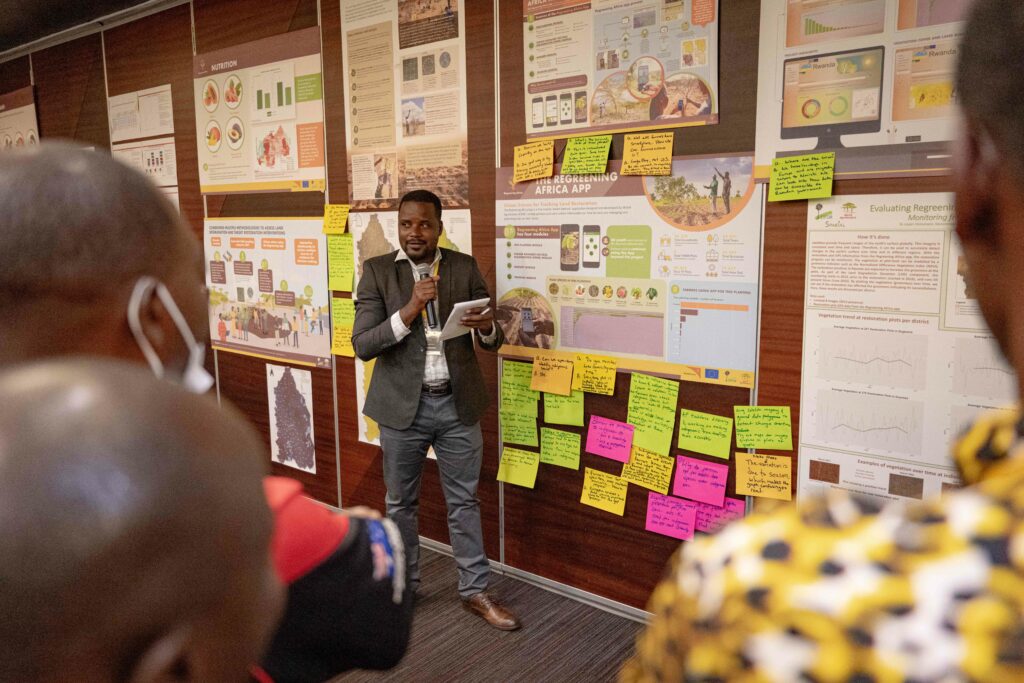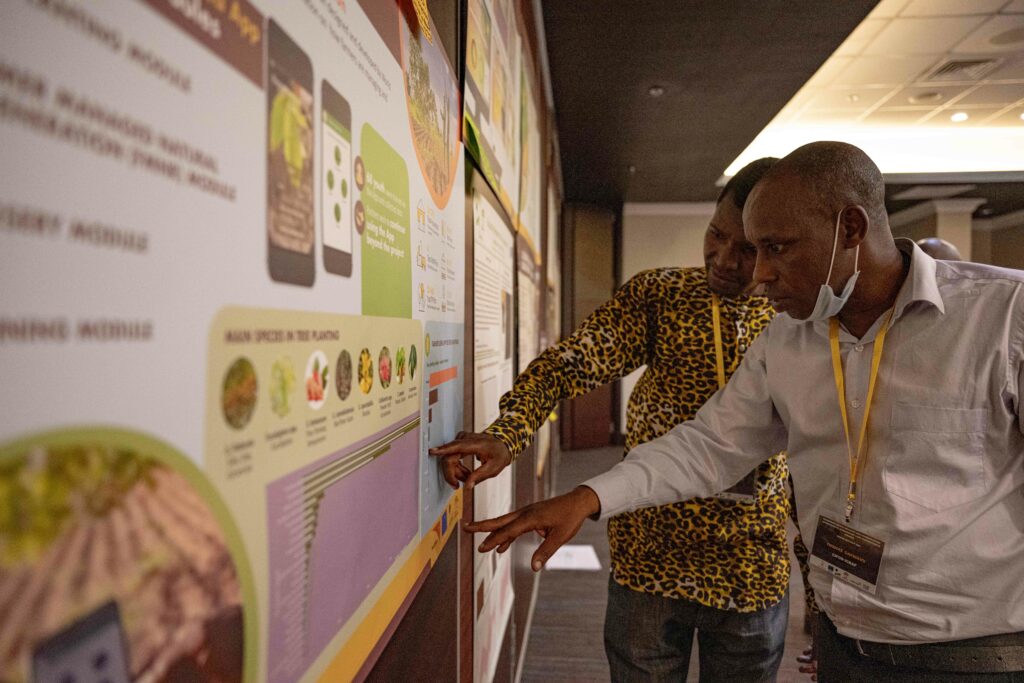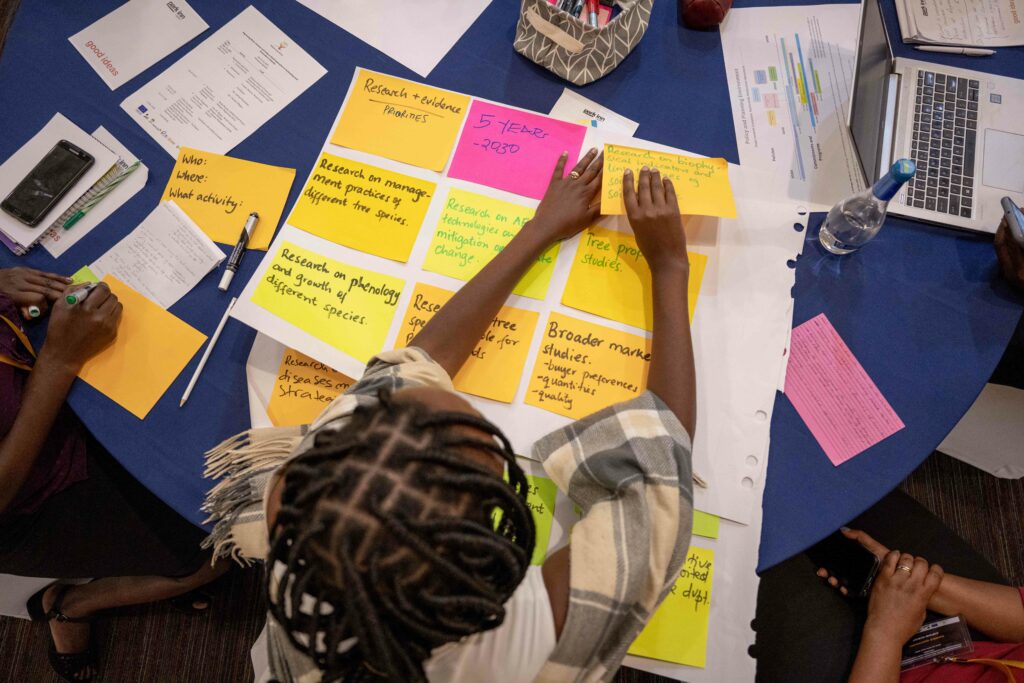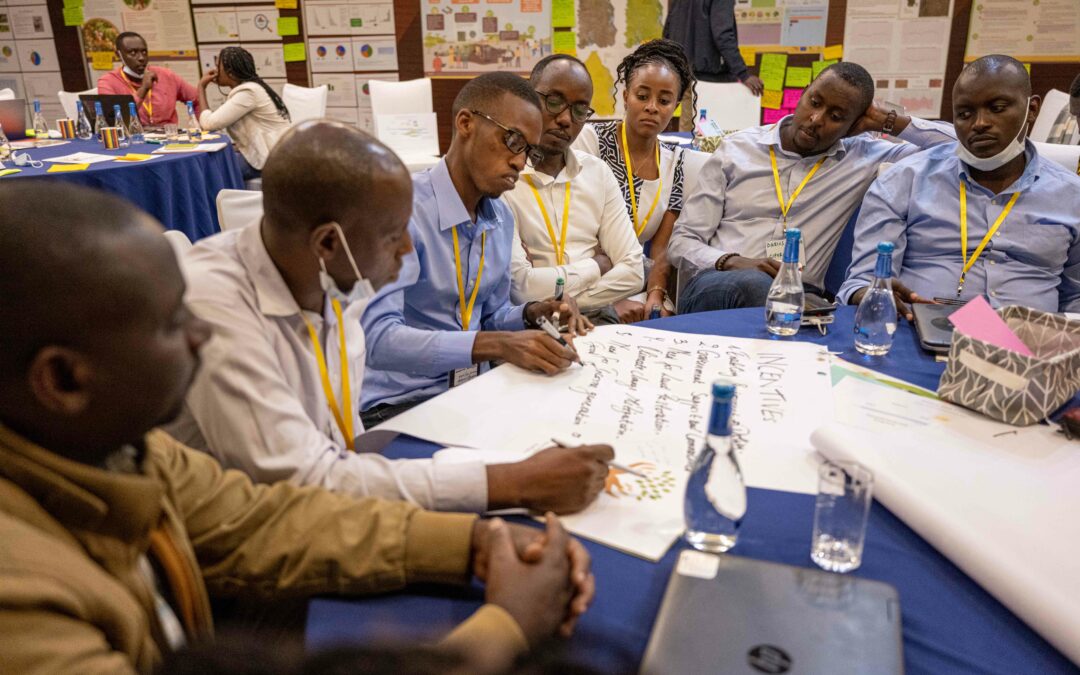By Sabrina Chesterman
At the nexus of the United Nations (UN) Decade on Ecosystem Restoration, the UN Convention to Combat Desertification climate conference, and that of the UN Framework Convention on Climate Change, the Regreening Africa Workshop in Rwanda was an excellent moment to bring together committed partners and actors in the country. Key Rwandan partners in restoration – from science, community, practice, policy and investment – came together in July this year to jointly formulate a clear action plan to accelerate land restoration and resilience in the country. Themed Inclusive and Evidence-based Approaches to Accelerating Land Restoration in Rwanda, the workshop was hosted by World Vision Rwanda and World Agroforestry (ICRAF) in collaboration with the Rwanda Forestry Authority.

Alex Mugayi, Regreening Africa country project manager gives a presentation at the workshop. Photo: Regreening Africa/Kelvin Trautman
The workshop, facilitated by the Regreening Africa Stakeholder Approach to Risk Informed and Evidence Based Decision Making (SHARED) component, identified the necessary priorities – for the farming community, researchers, national and local government as well as funders – to establish a robust, inclusive and sustainable action plan for restoring degraded land in Rwanda. Participants included farmers, World Vision employees, representatives from the European Union and GIZ, the German Federal Enterprise for International Cooperation, researchers from ICRAF, and several regional and national government officials. Together, they considered the current state of science, practice and policy for promoting agroforestry and land restoration in Rwanda that can accelerate positive change for landscapes and livelihoods. This was done through an interactive “evidence wall” allowing inclusive discussion and interrogation of data and key insights on the Regreening Africa programs.
As part of this evidence wall, participants were also updated on how Rwanda is taking up the Regreening Africa app. There were also key conversations on how to align the Regreening Africa dashboard with the Rwanda Forestry Authority’s complementary work to allow easy access to critical data to inform restoration planning. The interactive workshop also had key working group discussions that were particularly helpful in identifying incentives to increase the uptake of and benefits from land restoration, and pinpoint existing and future programs, strategies, policies and resources to sustain and expand restoration efforts.
 Participants at the workshop examine a poster on the evidence wall. Photo: Regreening Africa/Kelvin Trautman
Participants at the workshop examine a poster on the evidence wall. Photo: Regreening Africa/Kelvin Trautman
World Vision’s Alex Mugayi, who has led the implementation of the project in Rwanda, drew everyone’s attention to two major Regreening Africa successes: the lead farmer model, which the government wants to scale up in other projects and locations, and the development of training networks through rural resource centers.
“We have 70% farmers in the country, but 80% of the poor are farmers, and yet farmers are feeding the country. To change this, we need concrete action to raise awareness of tree planting and agroforestry. We need to explain both the economic and the environmental benefits. Importantly, farmers must be active and not passive participants.” – Joseph Gafaranga, Imbaraga Farmers Organisation.
By the end of the two-day workshop, participants had agreed on a series of actions to 2030 to be included in a national action plan for restoration. These actions will ensure that Rwanda’s plan effectively contributes to local, national and international commitments to sustainable livelihoods and ecosystem restoration. A strong message from the workshop was that farmer and indigenous community preferences for and interests in land restoration need to be recognized in Rwanda’s restoration action plan. Areas of major concern to the stakeholders present are pests and diseases, especially in fruit trees, barriers to accessing quality planting materials, and competing policy goals that deter farmers from adopting agroforestry.

Participants write action plans for 2030 that will be incorporated into a national action plan for restoration. Photo: Regreening Africa/Kelvin Trautman
Other key messages and actions that were highlighted include:
- The youth must be actively involved in the planning and implementation of restoration initiatives, and gender must be mainstreamed in all restoration activities.
- A concerted effort should be made to decentralize policy and create a specific, dedicated agroforestry policy body, and agroforestry adoption (especially of indigenous trees) should be incentivized.
- Research on the most effective extensive approaches, as well as on alternative fruits, should be exploited for enterprise development.
- Farmers and cooperatives should receive practical training (for example in pre-empting and managing disease and pests).
The farmers and government officials expressed interested in the capabilities of the Regreening Africa app and dashboard and its ability to track progress and develop reliable monitoring systems for land restoration.
A key outcome was the recognition of the recently established agroforestry taskforce led by the Rwanda Forestry Authority. The taskforce seeks to bring synergy across sectors to move land restoration forward. Providing co-ordination and leadership on policy and create an enabling environment for agroforestry, the taskforce will take forward the draft action plan developed at the workshop.
Spridio Nshimiyimana, acting director general of the Rwanda Forestry Authority, formally closed the workshop with positive reflections on Regreening Africa’s achievements and the key lessons learnt. He commended the workshop for its inclusivity and the value of the interactions with the farmers. “We need to scale the project and integrate the good work and progress made,” he said.
For more information on the workshop, including the workshop report and resources, please follow this link.
This story was produced with the financial support of the European Union. Its contents are the sole responsibility of Regreening Africa and do not necessarily reflect the views of the European Union.

